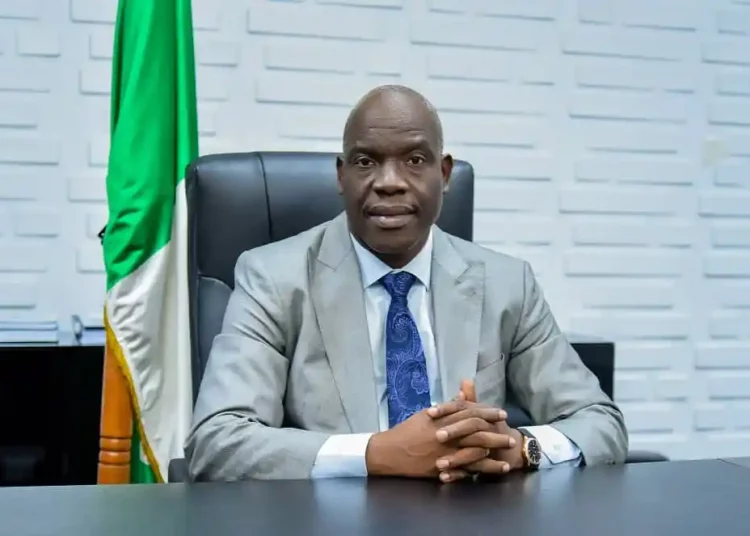The federal government said it has generated about N200 billion and $7million from the 2020 marginal fields bid round which it concluded with the award of oil petroleum prospecting licenses (PPLS) to winners in Abuja yesterday.
Chief executive officer of the Nigerian Upstream Petroleum Regulatory Commission (NUPRC), Gbenga Komolafe, made this known at the official unveiling of Host Communities Development Prospecting Licenses and presentation of PPLs to 2020 Marginal Field Awardees in Abuja.
The commission also officially unveiled the Host Communities Development Regulations and model Petroleum Prospecting Licences (PPLs).
Komolafe disclosed that the PPLs were awarded to 37 marginal fields who had fulfilled all the criteria for the award of the licences.
LEADERSHIP’s checks revealed that the 37 successful fields were won by a total 161 successful 2020 marginal fields award winners.
Among the successful companies are Ardova Plc, Matrix Energy Ltd., Sun Trust Oil Company Limited, Deep Offshore Integrated Service Ltd., Island Energy Ltd. and Sigmund Oil Field Ltd.
Others are Shafa Exploration and Production Company Ltd., Emadeb Energy Ltd., Zigma Ltd., Inland Basin Ltd. and Petraco Oil Ltd., among others.
Minister of state for Petroleum Resources, Timipre Sylva, speaking during the event, said the maiden presentation of the PPL was part of the implementation of Petroleum Industry Act (PIA), 2021.
Sylva urged the 57 marginal field investors to quickly develop their assets and enjoy the full benefits in the Petroleum Industry Act (PIA), which seeks to, among others, increase crude oil production, grow reserves and reduce cost of production.
Sylva urged the award winners to take advantage of the current attractive oil prices to bring the fields into full production within a short period in line with President Muhammadu Buhari’s aspiration.
He assured the investors that the industry regulator, NUPRC, will support any aspiration for upstream development with midstream facilities integration towards maximizing the value chain.
“It is envisaged that robust collaboration between the awardees and the Commission will lead to better understanding of the challenges being encountered. Therefore, I encourage you to promptly reach out to the Commission for guidance and support including mediations when challenges arise.
“The onboarding of new oil and gas players in the petroleum sector is part of this government’s policy to encourage more indigenous participation in our petroleum operations. Indeed, this will boost activities in the oil and gas sector, add to our production output, and create additional employment opportunities for Nigerians”, the minister stated.
Earlier in his remarks, the chief executive of NUPRC, Gbenga Komolafe, recalled that the marginal fields award initiative began in 1999, adding that 30 fields had been awarded, with 17 currently producing.
According to NUPRC, 57 fields presented in the 2020 bid round met the criteria and were subsequently offered for bidding.
Out of the 665 entities that expressed interest in the exercise,161 emerged as potential award winners, while out of the 57 fields, 41 were fully paid for.
Also, 37 fields were issued with the PPLs after they satisfied all conditions for the award.
The minister commended the management and staff of the NUPRC for ensuring the successful completion of the process, which began in 2020.
He described it as a giant milestone for the administration.
“The implementation of the PIA 2021 is in top gear. Consequently, the new awardees should note that their assets will be fully governed by the provisions of the PIA 2021.
“As you develop your assets with the special purpose vehicles (SPVs), ensure that good oilfield practice is employed, and that environmental considerations and community stakeholders’ management are not neglected.
“It is my strong belief that the awardees would take advantage of the current attractive oil prices to bring these fields into full production within a short period to increase production, grow reserves and reduce cost of production,’’ he said.
Sylva said the development would boost activities in the oil and gas sector.
He added that it would boost production output and create additional employment opportunities for Nigerians
NUPRC CEO Gbenga Komolafe recalled that one of the major tasks inherited by the commission, upon its inauguration in 2021, was the need to conclude the 2020 Marginal Field Bid Round.
He said the exercise was faced with several constraints which included the COVID-19 interruption, partial payment of Signature Bonuses by some award recipients , and the unwillingness of co-awardees to work together in forming SPVs for field development.
He said the marginal field’s award initiative began in 1999 and was borne out of the need to entrench the indigenisation policy of government in the upstream sector and build local content capacity.
He recalled that since its inception, a total of 30 fields had been awarded with 17 currently producing.
He said that the 2020 Marginal Field Bid Round exercise in respect of which PPLs were being issued had attracted government revenue of about N200 million and seven million dollars, respectively.
According to him, the passage of the PIA brought an end to the era of Marginal Field awards.
“Section 94 (9) of the Act states that no new Marginal Field shall be declared under this Act. Accordingly, the minister shall now award PPL on undeveloped fields following an open, fair, transparent, competitive, and non-discriminatory bidding process in line with Sections 73 and 74 of the Act,’’ he quoted.
Komolafe said the impact of the upswing in the crude oil price was not reflecting in the nation’s revenue earnings due to disruptions in our national oil production owing to sabotage, theft, and other operational challenges.
He urged the potential companies to take advantage of the current market realities and quickly bring their fields to production.
Speaking on the unveiled Host Communities Development Regulations, he said it was significant for the commencement of implementation of the provisions of Section 235 of the PIA, for the attraction of dividends to the host communities.











